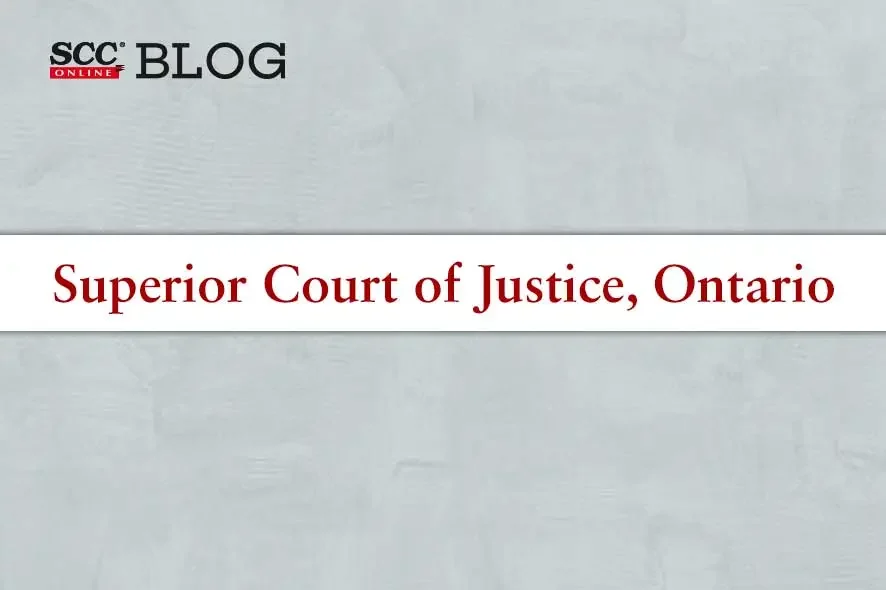Superior Court of Justice, Ontario: A motion for summary judgment was brought by the plaintiff against the third party (defendant’s insurer), seeking a declaration that full third-party limits were available to the defendant at the time of the incident. A Single Judge Bench of D.L. Edwards, J., granted the plaintiff’s summary judgment motion and held that third-party insurance coverage was available to the defendant at the time of the incident.
Brief Facts:
In the matter at hand, an incident occurred in Dunnville, Ontario wherein, a four-wheeled all-terrain vehicle was driven by the defendant and plaintiff was the passenger. The defendant took his father’s all-terrain vehicle (“ATV”) after obtaining his consent to help his friend whose ATV was stuck in the mud on a field. On his way back home, the defendant went off the trails and travelled along the shoulder of a road due to a snow squall. While driving along the shoulder road, the defendant drove the ATV into a culvert between the shoulder of the road and a farmer’s field. The ATV rolled over and both plaintiff and defendant were injured. The defendant possessed a G1 driver’s license which required a licensed driver to be seated next to the driver when driving a motor vehicle on Ontario highways. He was convicted of two offences under the Highway Traffic Act, 1990 – driving an ATV on a highway and for operating a vehicle on a highway without a proper license.
Defendant’s father was the registered owner of both the ATVs, he was insured with the third party under standard Ontario automobile policy, which included third party liability coverage of $1 million. Defendant was also an insured on the policy when he operated the insured vehicle with his father’s consent.
Issues:
Whether defendant’s father knew or ought to have known that defendant would breach statutory condition 4(1), when he consented to the defendant to drive his ATV?
The Court said that the nature of the consent given to defendant by his father is an important fact which must be determined. It was found that defendant’s father had given specific consent to drive on one highway i.e., ‘Central Lane’, for the sole purpose of going from their residence to the open field and back home, he was not otherwise permitted to drive on highways, except for the purpose of crossing the road to access the next trail. Thus, defendant’s father ought to have known that a person driving alone on an ATV on central lane and holding a G1 driver’s license, was breach of Statutory Condition 4(1). Further, the Court said that “it is reasonable and prudent for an owner and operator of an ATV to inform himself of the laws and regulations related to its use”.
Does breach of statutory condition 4(1) constitute breach void insurance coverage for the entire trip?
The Court relied on the test of reasonable foreseeability for assessing whether a vehicle breached the statutory conditions of the insurance policy. The Court placed its reliance on the factor that both the father and defendant were mistaken in believing that central lane was not a highway, although they were in error, but it is relevant. It is to be considered that the father of the defendant in his mind did not permit the defendant to drive on a highway. Thus, the Court found that father of the defendant did not permit him to drive on any highway other than central lane.
To answer that whether breach of statutory condition 4(1) by defendant’s father to permit him to drive on central lane mean that coverage for the entire trip was obviated, the Court placed its reliance on Beacomon v. Wawanesa Mutual Insurance Co., 2007 Carwell Ont. 9747 and said that “it is satisfied that, had the incident occurred on a trail in a field, the third party would have been obligated to defend the defendant and had potential liability”. Further, it was found that although defendant’s father did breach statutory condition 4(1), he only did so with respect to permitting the defendant to drive the ATV on central lane. That does not taint the entire trip. Defendant did not breach statutory condition 4(1) with respect to the balance of the trip or at the time of the incident. Further, it was found that consent to the defendant by his father was a minor breach, given the nature of the central lane, which is not a busy highway.
Thus, the Court granted the motion for a summary judgment and declared that full third-party policy limits were available to the defendant at the time of the incident.
[Breanne Pridmore v. Tyler Drenth, 2023 ONSC 817, decided on 01-02-2023]
Advocates who appeared in this case :
For the plaintiff: Advocate Daniel strigberger and Advocate Leah Burlock;
For the third party: Advocate Matthew Wells and Advocate Manvir Manku.







